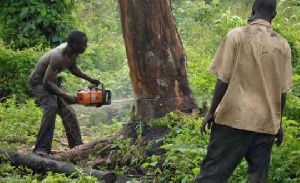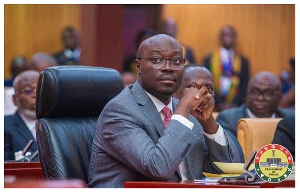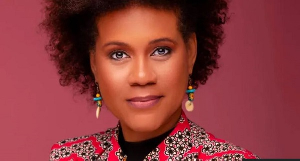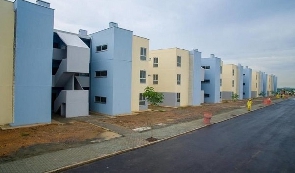The Metropolitan Chief Executive (MCE) for the Sekondi Takoradi Metropolitan Assembly (STMA) Mr Anthony K.K.Sam has bemoaned the indiscriminate felling of trees in the Metropolis.
He in this regard charged the media to execute its watchdog role by devoting more space and time to issues on tree planting and forest conservation to ensure the beautification of the metropolis.
According to him, the Assembly was in the process of reviewing its by-laws to enact laws punitive enough for culprits who flout the Assembly's directives to preserve trees and urban forest.
Mr Sam was delivering a keynote address at a project launch capacity building workshop on urban and peri-urban forestry aimed at greening the twin city of Sekondi-Takoradi.
It was organised by Goshen Global Vision (GGV), a Non-Governmental Organisation(NGO), and sponsored by the United States Forest Service International Programme at a cost of US$30,000.
The multi-stakeholder workshop which was on the theme, Urban and Peri-Urban Forestry: "Greening The Sekondi-Takoradi Twin City", was attended by representatives from the media, Forestry Commission, NADMO, Local Government Department of Parks and Gardens, Ghana Education Service(GES),Environmental Protection Agency(EPA),Ministry of Food and Agriculture, the STMA, Hen Mpoano and Effia-Kwesimintsim Municipal Assembly(EKMA).
Mr Sam noted that the success of the project depended on mass participation and urged residents in the city to get on board to sustain it.
He said the Assembly had embarked upon one child, one tree-planting project in schools in the Metropolis to create the awareness and safeguard the threat posed by climate change.
The MCE said the Assembly also started planting coconut trees along the beaches as part of its tree-planting projects.
Mr Sam said the Assembly in collaboration with the Ministry of Tourism, would protect the Monkey hill in Takoradi and fashion out a programme and strategise on greening the city.
He said the project was in tandem with government's flagship projects such as planting for food and jobs hence the Assembly would support it to succeed.
Dr Bertrand Nero, a Lecturer at the Department of Forest Resources Technology at the Kwame Nkrumah University of Science and Technology (KNUST), in a presentation, said number 11 of the Sustainable Development Goal (SDG) mandates all urban and peri-urban areas to have access to greening environment.
He said the global urban population was increasing with 54 per cent of people living in Urban Ghana which means with an increase in population, Africa would lose land to recreational activities and greening environment and Ghana is expected to hit 73 per cent by 2050.
Dr Nero said urban expansion in Takoradi between 1991 and 2008 was enormous with special reference to Effia-Kwesimintsim, Sekondi, Takoradi and Essikado-Ketan.
He called on policymakers to embark on spatial planning in Sekondi-Takoradi and make the area an Eco-city instead of making it a compact city
Dr Nero entreated the Assembly to champion the crusade and deepen awareness on urban forestry for residents and cautioned that urban forest should not be an afterthought but rather be incorporated at the beginning of any building project
Dr Nero noted that trees and vegetation in home settlements were ill-managed in the Western Region and entreated all to join the greening revolution to make the twin city more beautiful and attractive.
Touching on the benefits of trees, he said the presence of trees were pleasant to the eyes, refreshed and improved the health of the people.
On the economic and financial benefits, urban trees could increase property values by 7-18 per cent and assist in creating a destination of choice for investment as well as tourists and visitors.
The Lecturer added that urban forest improved performances of buildings by reducing heating and cooling costs and reduced health cost by improving the health of local populations through food, air and recreational facilities.
Dr Nero said Sekondi-Takoradi was experiencing the island heat effect as a result of clearing vegetation and replacing with buildings especially skyscrapers emphasising that "urban vegetation reduce urban heat island heat effect".
He said despite the hazards posed by urban forest such as dropping of animal faeces, falling of leaves, spread of pests and diseases, damage to infrastructure, low air quality and spread of invasive species, urban forest has an aesthetic effect on the people.
The Executive Director of Goshen Global Vision, Madam Perpetua Mary Kwakuyi was confident that the NGO was bent on greening the twin-city.
She said the United States of America took the lead in greening the Sekondi-Takoradi metropolis and appealed to companies and organisations to assist in making the twin city a garden city.
Goshen Global Vision is a local NGO partnering with United States Forest Services International Programme (USFS-IP) to follow up on the activities of the Coastal Sustainable Landscape Project (CSLP).
Currently, the NGO works in 72 communities in Ghana's Western Region to build resiliency through community-based natural resource management, increasing tree cover while improving livelihoods.
General News of Thursday, 26 September 2019
Source: ghananewsagency.org
Media must launch crusade against urban forest depletion
Entertainment
















